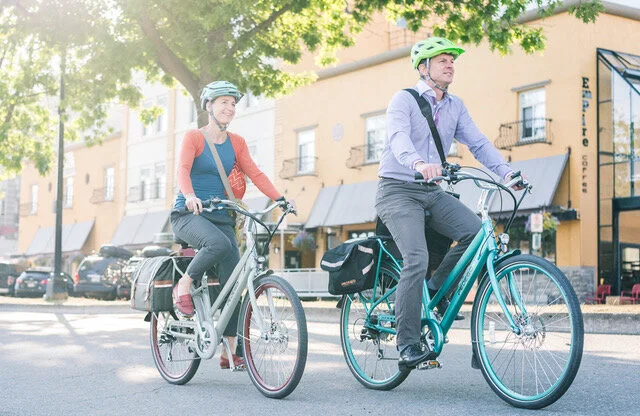Under the terms of a new resilience funding stream within the 12-year Investing in Canada Infrastructure Program (ICIP), up to $413 million could be allocated to cycling projects in British Columbia. But, according to the BCCC, little to none of these funds may end up being allocated to active transportation projects in the province.
Read MoreOn July 27th, the provincial government announced new and improved incentives intended to encourage British Columbians to buy electric-assist bicycles, or e-bikes. While the provincial government is contributing a total of $4 million to the rebates over the next two years, some believe the conditions of the consumer program may be too restrictive to result in meaningful shifts of British Columbians out of their cars and onto bicycles.
Read MoreYesterday, the Province of British Columbia announced almost $9m in grants awarded to active transportation infrastructure projects in municipalities across the province. The total amount of funding dropped from $10 million in 2019, to approximately $8.4 million in 2020; the total number of projects benefiting from provincial funds dropped by five, from 28 to 23.
Read MoreIt is estimated that less than 30% of cycling collisions with motor vehicles are collected by official sources, such as ICBC or police, leaving most incidents unreported.
BikeMaps.org was launched by UVic researchers in 2014, with the goal of capturing more data on bicycling safety, and to inform transportation policy-makers, planners and engineers on real-world experiences of people who bike.
Read MoreThe BC Cycling Coalition has been working with members and stakeholders to develop four sets of recommended actions for the provincial government, which we’ve made public in a document entitled, “Recommendations to the Government of BC: Active Transportation for States of Emergency.”
Read MoreRelated to the current pandemic, articles and research proposals currently circulating in the public have included recommendations related to physical spacing while cycling and walking without citing peer-reviewed evidence to support their claims.
Read MoreMaintaining our active transportation options—the ability to walk, bike, and wheel—can help us all achieve Canada's physical activity guidelines, and is as important as ever for our quality of life.
If you have no symptoms, stay 2 metres (6 feet) away from others, and strictly follow Health Canada’s COVID-19 prevention rules, you can walk and cycle in support of your physical and mental health.
Read MoreLast year, changes went into effect at ICBC in order to limit costs and make the rating system fairer — and more just — for all who drive.
However, not every British Columbian owns or drives a motor vehicle. Vulnerable road users — people who predominantly walk, cycle or wheel for transportation, as well as those who use transit — represent neither the source of a significant proportion of the losses at the Crown corporation, nor the overriding need to overhaul its rating system.
Read MoreThe Province of British Columbia’s Select Standing Committee on Finance and Government Services have recommended eliminating PST on electric assist bicycles.
Currently, bicycles and transportation fares in BC are exempt from PST charges, and clean energy vehicles are eligible for rebates up to $5,000.
Read MoreA resolution calling on the province to support effort advocacy efforts to modernize the Motor Vehicle Act passed at the 2018 Union of BC Municipalities (UBCM) conference.
Moved by The City of New Westminster, the resolution entitled ‘Updating the BC Motor Vehicle Act to Improve Safety for All Road Users’ voiced support for meaningful recommendations toward reform of the Act, as expressed by the position paper ‘Modernizing the BC Motor Vehicle Act’, authored by the Road Safety Law Reform Group of British Columbia.
Read MoreRising competitive cycling star Ellen Watters died after having been struck by a motorist near Sussex, NB, in December 2016. Watters, 23, was on a training ride.
Read More











